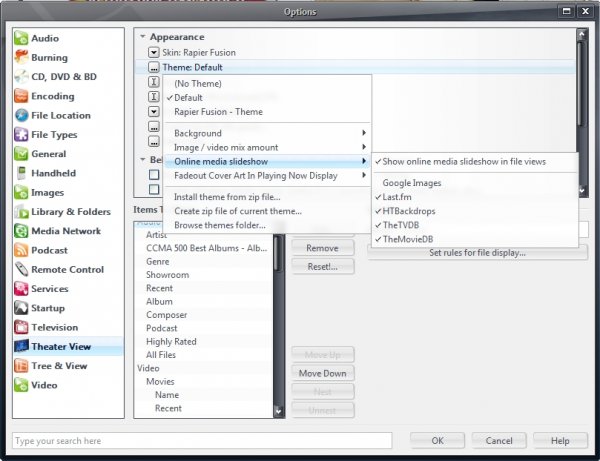Thanks for your response.
>"As a guy who used to manage a 50 person team that developed media players, "them are fighting words!"
The size of the team can sometimes be an indication that you are NOT using the best technology: http://www.touregypt.net/featurestories/pyramidworkforce.htm
>"Most importantly for me personally is usability. How easy is it to find your content on the PC and increasingly these days, on a remote device?"
MySQL and many free database designs allow blink time searches. If Google can search all the pages on the Internet for the occurrence of any string, then the search needs regarding one's music colletion (even if approaching a million tracks) has been already solved. The competing algorithms and data structures to do this are well known and free. No need to proprietorize this commodity capability into $50 packages we only have to purchase again for each revision.
>"I am personally not a fan of Jriver, having found it lacking in usability so I am not saying to defend Jriver."
I have similar experience.
>"But let's not trivialize what is in these media players."
Agreed. Instead, lets make their functions clear. Searching, converting, sending the correct bits to an external DAC which has been designed with its own clock (if necessary) to avoid jitter, and to make any inherent analog internal noise inaudible. There is free software that provides search, conversion, and for that matter ripping. At one time perhaps it took 50 people to create this. No longer. Clear sound and music help make for a better world. To the extent software needs to be improved just freely publish the source code and let others improve it.. Kind of like communication. Not against making money or competition, but not when it is FUD.
>"As a guy who used to manage a 50 person team that developed media players, "them are fighting words!"
The size of the team can sometimes be an indication that you are NOT using the best technology: http://www.touregypt.net/featurestories/pyramidworkforce.htm
>"Most importantly for me personally is usability. How easy is it to find your content on the PC and increasingly these days, on a remote device?"
MySQL and many free database designs allow blink time searches. If Google can search all the pages on the Internet for the occurrence of any string, then the search needs regarding one's music colletion (even if approaching a million tracks) has been already solved. The competing algorithms and data structures to do this are well known and free. No need to proprietorize this commodity capability into $50 packages we only have to purchase again for each revision.
>"I am personally not a fan of Jriver, having found it lacking in usability so I am not saying to defend Jriver."
I have similar experience.
>"But let's not trivialize what is in these media players."
Agreed. Instead, lets make their functions clear. Searching, converting, sending the correct bits to an external DAC which has been designed with its own clock (if necessary) to avoid jitter, and to make any inherent analog internal noise inaudible. There is free software that provides search, conversion, and for that matter ripping. At one time perhaps it took 50 people to create this. No longer. Clear sound and music help make for a better world. To the extent software needs to be improved just freely publish the source code and let others improve it.. Kind of like communication. Not against making money or competition, but not when it is FUD.
As a guy who used to manage a 50 person team that developed media players, "them are fighting words!"
There is a lot more to a media player than how it stores the bit and how it opens the device to spit them out. For starters, is the interface. How easy is it to manage and store all of your metadata? People seem to like Jriver for its extensive metadata handling for classical music and such. Other considerations are richness of album metadata service and ripping accuracy. Most importantly for me personally is usability. How easy is it to find your content on the PC and increasingly these days, on a remote device? Is there a rich iPad or Android experience for example?
I am personally not a fan of Jriver, having found it lacking in usability so I am not saying to defend Jriver. But let's not trivialize what is in these media players. I think the one we were developing crossed the one million lines of code!











